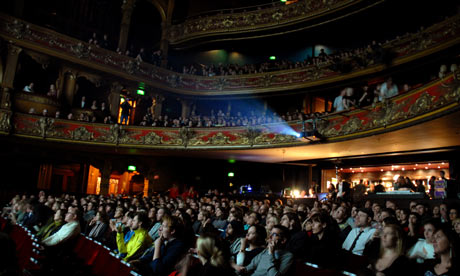 Anthony Lane is one of the finest film critics at work today, and his reviews for the New Yorker are always worth reading, not just for their fine, literary, perceptive commentary, suffused with the empathy of the genuine film-goer and a pervasive wit, but also for the light he manages to shed on one of the central elements of our contemporary culture. In this week's edition, he uses his review of the crime caper 'Tower Heist', and the pessimistic fable 'Melancholia', to pass judgement on the concept of home cinema. Whatever their merits as films (Lane is hilariously cool about 'Tower Heist', definitely taken with 'Melancholia'), they share a history as films that were planned to go straight to Video On Demand, alongside their cinematic release - or as near as. The distributors of 'Tower Heist' eventually relented, but 'Melancholia' was available 'on demand' long before it was released in the cinema.
Anthony Lane is one of the finest film critics at work today, and his reviews for the New Yorker are always worth reading, not just for their fine, literary, perceptive commentary, suffused with the empathy of the genuine film-goer and a pervasive wit, but also for the light he manages to shed on one of the central elements of our contemporary culture. In this week's edition, he uses his review of the crime caper 'Tower Heist', and the pessimistic fable 'Melancholia', to pass judgement on the concept of home cinema. Whatever their merits as films (Lane is hilariously cool about 'Tower Heist', definitely taken with 'Melancholia'), they share a history as films that were planned to go straight to Video On Demand, alongside their cinematic release - or as near as. The distributors of 'Tower Heist' eventually relented, but 'Melancholia' was available 'on demand' long before it was released in the cinema.It is this which provokes Lane's reflection that, call it what you will, video at home is NOT cinema! Yes, he understands why you might feel tempted to avoid the cinema, suggesting the average reaction of the film buff to the chance to watch at home might be thus:
“Can you blame us?” they will cry. “Who wants to pay for a sitter, drive twenty miles in the rain, and sit in a fug of vaporized popcorn butter next to people who are either auditioning for ‘Contagion 2’ or texting the Mahabharata to their second-best friends?”
But there is much more to consider, and Lane comes up with an almost elegiac defence of the collective cinema experience:
There’s only one problem with home cinema: it doesn’t exist. The very phrase is an oxymoron. As you pause your film to answer the door or fetch a Coke, the experience ceases to be cinema. Even the act of choosing when to watch means you are no longer at the movies. Choice—preferably an exhaustive menu of it—pretty much defines our status as consumers, and has long been an unquestioned tenet of the capitalist feast, but in fact carte blanche is no way to run a cultural life (or any kind of life, for that matter), and one thing that has nourished the theatrical experience, from the Athens of Aeschylus to the multiplex, is the element of compulsion. Someone else decides when the show will start; we may decide whether to attend, but, once we take our seats, we join the ride and surrender our will. The same goes for the folks around us, whom we do not know, and whom we resemble only in our private desire to know more of what will unfold in public, on the stage or screen. We are strangers in communion, and, once that pact of the intimate and the populous is snapped, the charm is gone. Our revels now are ended.


No comments:
Post a Comment